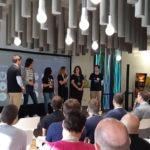Computer programming, moving toward a gender-neutral domain
Loners and freaks who are addicted to video games, love junk food, and inhabit basements: the computer programmer stereotype, propagated by the silver screen, is a serious setback when it comes to attracting talent into this field. And it is much worse when it comes to attracting female talent. In Spain in 2017, the rate of women between 20 and 29 years old, graduating in science, mathematics, information technology, or engineering per 1,000 inhabitants was 13.1 percent. The scarcity of female talent in this field can also be witnessed at hackathons, but there's good news: women are willing to put an end to these clichés.

A hackathon is a competition focused on using programming skills to solve a problem in a short space of time, as such participating in one may seem like an extreme experience. A highly stressful marathon with few women participants (which should come as no surprise). BBVA has a long history coordinating these kinds of events. Since 2014, it has organized various flavors of hackathons for both employees and to attract external talent.
The bank’s “The Ninja Project” — which was created to bolster and showcase employee technological talent by fostering a culture of learning and self-development — periodically gathers the best in-house programmers for these events. Knowing that women are typically underrepresented, there was a pleasant surprise at the most recent hackathon. "We had worried about how to encourage more women programmers to participate in our events when we saw that an all-female team had signed up.” David Hernantes, head of BBVA's Ninja Program, says. “Participant diversity fits perfectly with one of the bank’s strategic priorities, and we work to identify those elements of the hackathons that women might find alienating so that we can change them and make the events as ‘diversity-friendly’ as possible,” he added.
The myth of the “he-man” hackathon
Hackathons are traditionally associated with ultra-competitive environments, with intense schedules and rife with conflict, elements that may seem to discourage ‘a priori’ female participation. "We are all very competitive here. We were the first ones here this morning. It’s a myth," says Sandra Olalla, who led the women's team in the Ninja Project’s last hackathon.

The GooGirls women's team during their presentation at the hackathon - BBVA
"The idea of joining forces was entirely intentional. I said to myself: why not take advantage of our female colleague's capabilities in order to gain a bit more visibility, and that's how it all started.” The brainchild of this idea is GooGirls, a team of four computer programmers and engineers from BBVA Next Technologies, who are eager to stare down the gender gap and hoped to win the hackathon.
Gema Arnaiz, another member of the team, does not believe that the low number of women participants can be attributed to the hackathon format. "It has more to do with insecurity. You come to an event like this and you ask yourself if you're going to be able to compete, how far will you get. You create a hurdle for yourself," she says. "In reality when you get here, you realize that everyone has their fears, men and women," adds Sandra.
According to Nayeli Cases the problem arises from the underrepresentation of women in computer science: "Ultimately, there are few of us women in the world of technology. Personally, I have always worked with men, and I don't feel more intimidated at these events just because men outnumber women.” They all confess that although gender equality in the field is closer than it has ever been, “throughout your professional life, you’re followed by that feeling that you have to prove yourself more than others. In our day-to-day we are always comparing ourselves to our male colleagues, who don't have this barrier. We wanted to contribute by showcasing our potential; we have to start freeing ourselves naturally of this impediment,” Sandra says.
Building environments that encourage equality, moving towards gender parity on judges’ panels, and celebrating our female role-models all contribute to this cause. "Universities and schools are working hard to try to steer girls into IT careers", says Laura Vera, member of GooGirls.
She and her teammates have broken new ground with their team participation, but they won't be the last ones. "I would encourage all women to sign up to compete. The more of us that there are, the more chances an all-women team will walk away with the prize" Laura says. Ultimately, GooGirls did not win the hackathon prize, but they did earn the recognition of their colleagues, and they learned a lot: "The experience of having participated with my female colleagues is a great take-away. We were the perfect 'dream team' and I would participate in any hackathon with them by my side," Sandra proudly concludes.